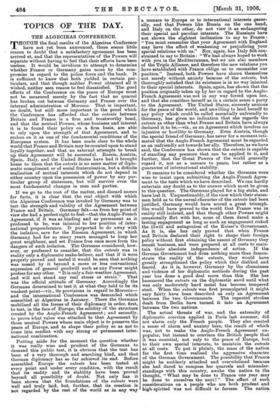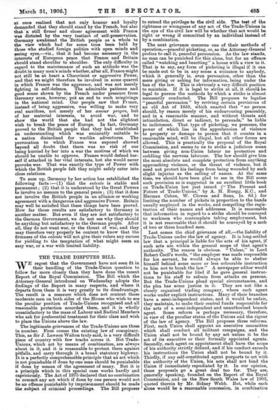TOPICS OF THE DAY.
THE ALGECIRAS CONFERENCE. THOUGH the final results of the Algeciras Conference have not yet been announced, there seems little reason to doubt that a satisfactory agreement has been arrived at, and that the representatives of the Powers will separate without having to feel that their efforts have been useless. It would be invidious to attempt to determine whether France or Germany gains more by the com- promise in regard to the police force and the bank. It is sufficient to know that both yielded in certain par- ticulars, and that though neither Power obtained all it wished, neither sees reason to feel dissatisfied. The good effects of the Conference on the peace of Europe must not be measured merely by the fact that no quarrel has broken out between Germany and France over the internal administration of Morocco. That is important, no doubt, but still more important is the proof which the Conference has afforded that the entente between Britain and France is a firm and trustworthy bond, and that the neutral Powers, whose business and interest it is to found their policy on a firm basis, are able to rely upon the strength of that Agreement, and. to reckon on it as one of the fundamental conditions of the European system. It has been made clear to the whole world that France and Britain may be counted upon to stand loyally together, and that no external attempts to break up their Agreement will be successful. Russia, Austria, Spain, Italy, and the United States have had it brought home to them that the entente is no mere matter of diplo- matic compliment or of social fraternisation, but a definite realisation of mutual interests which do not depend in either country upon the possession of power by any par- ticular group of statesmen, but will survive even the most fundamental changes in men and parties.
If we go to the root of the matter, and discard names for facts, it is clear that the real object with which the Algeciras Conference was invoked by Germany was to test the strength and validity of the Agreement between France and Britain. Germany felt—as from her point of view she had a perfect right to feel—that the Anglo-French Agreement, if it was as binding and as permanent as it professed to be, was inimical to her position of inter- national preponderance. It purported to do away with the isolation, save for the Russian Agreement, in which Germany had for so many years managed to keep her great neighbour, and set France free once more from the dangers of such isolation. The Germans considered, how- ever, or professed. to consider, that the entente was in reality only a diplomatic make-believe, and that if it were properly proved and tested it would be seen that nothing was meant by it beyond a more or less conventional expression of general goodwill such as any Power might profess for any other. "It is only a fair-weather Agreement, and. will not stand any real stress or strain." That was the official attitude of Germany. Accordingly the Germans determined to test it at what they held to be its weakest point—viz., its provisions in regard to Morocco— and the international Conference was demanded which assembled. at Algeciras in January. There the Germans mobilised all the forces of their diplomacy in order, first, to test, in the face of Europe, the solidity of the structure created by the Anglo-French Agreement ; and secondly, to prove what value was attached to that Agreement by those neutral Powers whose main object is to preserve the peace of Europe, and to shape their policy so as not to come into conflict with any strong or permanent inter- national combination.
Putting aside for the moment the question whether it was really wise and. prudent of the Germans to demand this public test, it is obvious that the test has been of a very thorough and searching kind, and that German diplomacy has so far achieved its end. Before assembled Europe the entente has been tested at every point and under every condition, with the result that its reality and its stability have been proved beyond all possibility of doubt. Not only has it been shown that the foundations of the entente were well and truly laid, but, further, that its creation is not regarded by the rest of the world as in any way a menace to Europe or to international interests gener- ally, and that Powers like Russia on the one hand, and Italy on the other, do not view it as endangering their special and peculiar interests. The Russians have not shown the slightest inclination to say to France : "You must remember that your Agreement with England may have the effect of weakening or prejudicing your special relations with us." Nor, again, has Italy felt con- strained to say to Britain : "We had always hoped to work with you in the Mediterranean, but we are also members of the Triple Alliance, and therefore the new relations you have established with France oblige us to reconsider our position." Instead, both Powers have shown themselves not merely without anxiety because of the entente, but thoroughly satisfied that its existence is in no way inimical to their special interests. Spain, again, has shown that the position originally taken up by her in regard to the Anglo- French Agreement was not in any way forced upon her, and that she considers herself as in a certain sense a party to the Agreement. The United States, sincerely anxious for the peace of the world, and unwilling to lend herself to any policy which could be called essentially unfriendly to Germany, has given no indication that she regards the entente as other than what France and Britain have always declared it to be,—viz., as an Agreement which involves no injustice or hostility to Germany. Even Austria, though the special friend of Germany, has never for a moment inti- mated that the Anglo-French Agreement must be regarded. as an unfriendly act towards her ally. Therefore:as we have said, the Conference has shown that the entente is capable of standing any pressure that can be applied to it, and. further, that the Great Powers of the world generally regard it, not as a menace to peace, but rather as a guarantee of international stability.
It remains to be considered whether the Germans were wise to insist upon submitting the Anglo-French Agree- ment to the tests which we have described. We can hardly entertain any doubt as to the answer which must be given to this question. The Germans played for a big stake, and have lost it. Unquestionably, if the view which their states- men held as to the unreal character of the entente had been justified, Germany would have scored a great triumph. She would have proved to the world. that France was in reality still isolated, and that though other Powers might occasionally flirt with her, none of. them dared make a lasting engagement as long as such an engagement risked the illwill and antagonism of the Kaiser's Government. As it is, she has only proved that when France and. Britain declared their right to shape their foreign policy without first obtaining the assent of Germany they meant business, and were prepared. at all costs to main- tain their absolute independence of action. If the German Government had done nothing more than demon- strate the reality bf the entente, they would have greatly strengthened the policy which they disliked and feared. As it is, however, Germany by the clumsiness and violence of her diplomatic methods during the past year has done a good deal more than this. She has hammered the entente on the diplomatic anvil until what was only moderately hard metal has become tempered steel. When the entente was first promulgated it might very fairly have been described as only an Agreement between the two Governments. The repeated strokes dealt from Berlin have turned it into an Agreement between the two nations.
The actual threats of war, and the extremity of diplomatic coercion applied in Paris last summer, did not alarm only the French people. They also created a sense of alarm and anxiety here, the result of which was, not to make the Anglo-French Agreement un- popular, but instead to convince the British people that it was essential, not only to the peace of Europe, but to their own special interests, to maintain the entente at all costs. To put it plainly, the mass of the nation for the first time realised the aggressive character of the German Government. The possibility that France might be suddenly attacked and overwhelmed because she had. dared to compose her quarrels and. misunder- standings with this country, awoke the nation to the thought, "What may be done to France one year may be done to ourselves the next ! " The effect of such considerations on a people who are both prudent and high-spirited was not difficult to foresee. The nation at once realised that not only honour and loyalty demanded that they should stand by the French, but also that a still firmer and closer agreement with France was dictated by the very instinct of self-preservation. Germany awakened the British people as a whole to the view which had for some time been held by those who studied foreign politics with open minds and seeing eyes,—viz., that it had become necessary in the interests of European peace that France and Britain should stand shoulder to shoulder. The only difficulty in regard to the maintenance of such an attitude was the doubt in many men's minds whether, after all, France might not still be at heart a Chauvinist or aggressive Power, and that we might therefore be involved in some quarrel in which France was the aggressor, and was not merely fighting in self-defence. The admirable patience and good sense shown by the French under pressure from Germany soon, however, put an end to such misgivings in the national mind. Our people saw that Ft Ince, instead of being aggressive, was willing to make very real sacrifices, not merely of her amour propre, but of her material interests, to avoid war, and to show the world that she had not the slightest wish to break the peace of Europe. In fact, Germany proved to the British people that they had established an understanding which was eminently suitable to a nation disinclined for warlike adventures. The provocation to which France was exposed showed beyond all doubt that there was no risk of our being hurried by her into a war the motives of which we should be unable to approve. France would defend her- self if attacked in her vital interests, but she would never provoke war. That was exactly the type of Power with which the British people felt they might safely enter into close relations.
To sum up, Germany by her action has established the following facts :—(1) that the entente is stable and permanent ; (2) that it is understood by the Great Powers to involve no menace to the general peace ; (3) that it does not involve the British people in an alliance or working agreement with a dangerous and aggressive Power. Britain may well be satisfied that these things have been proved. How far those results are satisfactory to Germany is another matter. But even if they are not satisfactory to the German Government, we do not see why they should be anything but satisfactory to the German people. After all, they do not want war, or the threat of war, and they may therefore very properly be content to know that the firmness of the entente will not give their rulers any excuse for yielding to the temptation of what might seem an easy war, or a war with limited liability.











































 Previous page
Previous page